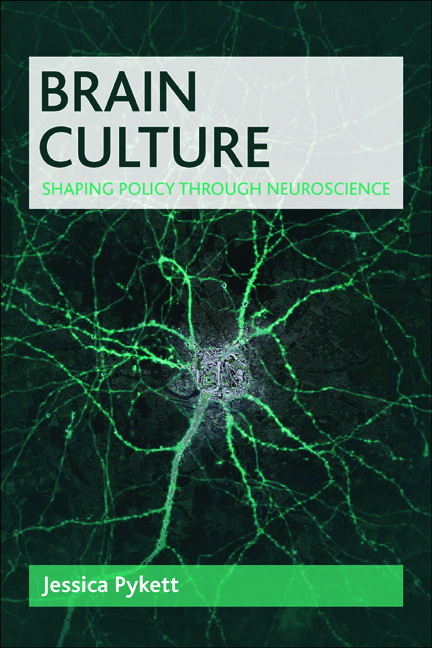Book contents
- Frontmatter
- Dedication
- Contents
- About the author
- Acknowledgements
- Preface
- One Introduction: governing through brain culture
- two Brain culture in context
- three Designing cerebral cities
- four Teaching the learning brain
- five Managing workplace emotions
- six Conclusion: what is at stake in the brain world?
- References
- Index
two - Brain culture in context
Published online by Cambridge University Press: 10 March 2022
- Frontmatter
- Dedication
- Contents
- About the author
- Acknowledgements
- Preface
- One Introduction: governing through brain culture
- two Brain culture in context
- three Designing cerebral cities
- four Teaching the learning brain
- five Managing workplace emotions
- six Conclusion: what is at stake in the brain world?
- References
- Index
Summary
A psycho-spatial analysis of brain culture: understanding Context
How do neuroscientific, behavioural and psychological accounts of everyday behaviour reconfigure our sense of citizenship? Responding to this question means taking seriously the historical and geographical situation of the citizen who is governed through the brain, and the social and political context in which brain culture has emerged as a way of explaining the human condition. This chapter sets up the analytical framework pursued in the remainder of the book. It describes how various spatial insights from the discipline of human geography present an original perspective from which to politically analyse policies and practices influenced by brain culture. It is argued that the subsidiary endeavours of behavioural geography and environmental psychology, non-representational geographies and Foucauldian geographies of political rationality generate new questions regarding the role of brain culture in contemporary practices of governance and citizenship.
Principally, the chapter investigates the whereabouts of subjectivity, and argues for a geographical approach to analysing those practices and policies which have been influenced by brain culture. It extends the approaches of those pursuing psycho-social analysis who refuse to separate the subjective and psychological from social context. The two are seen as mutually constitutive within the psycho-social approach. Some of these approaches integrate psychoanalytic understandings of the relationship between the conscious and unconscious, with an attention to the material, social and cultural structures that shape and are shaped by human subjectivity and action (see, for example, Walkerdine et al, 2001). Others are concerned with understanding precisely how everyday social practices are implicated in subject formation and the production of social relationships without recourse to the supposedly hidden psychic drives of the unconscious (see, for example, Wetherell, 2012, p 134). It is this latter focus on the ‘organisation and normative logics of the unfolding situated episode, context, interaction, relation and practice’ – with an additional emphasis squarely on where everyday social practices co-constitute subjectivities (particularly citizen subjectivities) – which informs the psycho-spatial approach developed in this chapter.
I begin by briefly exploring how the spatial tropes of situatedness, context and environments are addressed in existing accounts provided in social neuroscience, popular psychology and their critics, before introducing the contribution of human geography to these debates.
- Type
- Chapter
- Information
- Brain CultureShaping Policy through Neuroscience, pp. 37 - 70Publisher: Bristol University PressPrint publication year: 2015



